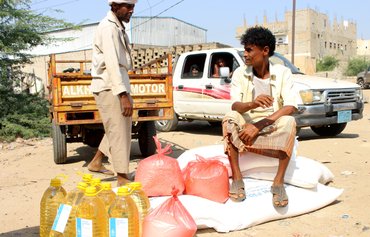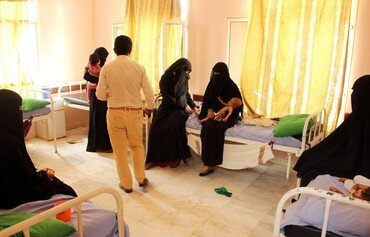Yemeni officials who spoke to Al-Mashareq applauded the World Food Programme's 2020 Nobel Peace Prize win, saying it had made "tremendous efforts" to fight hunger in the nation and world.
Addressing the Houthis' claim, following the October 9th win, that the UN programme lacked neutrality, they noted that the Iran-backed militia has consistently obstructed the distribution of aid in Yemen.
The WFP was recognised "for its efforts to combat hunger, for its contribution to bettering conditions for peace in conflict-affected areas and for acting as a driving force in efforts to prevent the use of hunger as a weapon of war and conflict", according to the award citation.
Until April of this year, the WFP provided food for some 13 million Yemenis every month, in a country where over 20 million do not have access to sufficient amounts of food and nearly 10 million suffer from acute food insecurity.
That month, however, it announced it would halve food aid in areas controlled by the Houthis (Ansarallah), saying it was "facing a severe lack of funding in a very difficult environment" in areas controlled by the Iran-backed militia.
It said a number of donors had cut back on the aid they provided to Yemen due to the obstacles the Houthis created that prevented the aid from reaching targeted beneficiaries.
In 2019, after some supplies intended for civilians were stolen, the programme suspended food distribution in Houthi-controlled areas for two months.
The WFP said its decision was taken after negotiations stalled on an agreement to introduce biometric controls, such as fingerprinting, "to prevent the diversion of food away from some of the most vulnerable people in Yemen".
In late 2018, the WFP reported that many residents of Houthi-controlled Sanaa had not received their allotted food aid, and that in some other areas of Yemen, people had been deprived of full food rations.
It demanded that the Houthis stop interfering with the distribution of food aid.
Houthis interfered with aid distribution
Sources in Yemen told Al-Mashareq the Houthis' criticism stems from the fact that food has not been distributed in areas under their control as much as it has been in other areas.
Houthi official Talaat al-Sharjabi said the WFP "has largely failed in fighting hunger, because a large number of people suffer from malnutrition. It has also failed to remain neutral in distributing humanitarian aid in Yemen".
Yemen's Deputy Minister of Human Rights Nabil Abdul Hafeez told Al-Mashareq the Houthis have interfered with relief distribution "directly and indirectly".
"They forced aid organisations to hire workers affiliated with them and manipulated aid distribution," he said. "They also stole food and distributed it among Houthi militants, as evidence has proven."
"The Houthis demanded that cash assistance begin before registration via the fingerprint system," Murad al-Gharati, an advisor at Yemen's Ministry of Human Rights, told Al-Mashareq.
Accountability issues aside, he said, "it is difficult to convert the food aid into financial aid amid the country's current conditions".
Meanwhile, as the population goes hungry, the Houthis on September 24th marked 2,000 days of "resistance" against the Arab coalition in Sanaa with a display of stacks of cash, food and other donations presented to their fighters.
As the country teeters on the edge of famine, piles of food donated by tribesmen were loaded on trucks and displayed at Sanaa's al-Sabeen Square, AFP reported.
In the middle of the square was a multi-layered pyramid of Yemeni riyals, closely guarded by armed fighters, and another set of stacks on the ground spelling out "2000".
Other banknotes were arranged to spell out September 21st, the date on which the Houthis seized control of the capital during their coup.
Tremendous effort, despite difficulty
The WFP has undoubtedly made tremendous efforts to fight world hunger and deserved the recognition it received, said Studies and Economic Media Centre chairman Mustafa Nasr.
"This is an encouraging message for humanitarian action against poverty and hunger in the world," he told Al-Mashareq.
But "the programme faced a great deal of difficulty in Yemen", he said, pointing to "catastrophic errors" for which he said both the WFP and the Houthis are to blame. "These errors included directing aid to undeserving recipients."
Economist Abdul Aziz Thabet told Al-Mashareq those who follow the WFP's work in Houthi-controlled areas find it has diligently worked to deliver food to designated beneficiaries.
This, he said, has been in spite of the Houthis seizing aid at times, or their occasional manipulation of the distribution process.
Thabet said it is true that WFP officials gave in to some Houthi pressure, albeit reluctantly. But despite risks to their lives, he said, they continue delivering food after five years of war and hunger in Yemen.
He noted that mistakes are part of the process of working in a country where there is an armed group that does not respect law and order and creates obstacles for humanitarian organisations.

![Swedish Prime Minister Stefan Lofven (L) stands with World Food Programme executive director David Beasley in Stockholm in October, after WFP's Nobel Prize win. [Janerik Henriksson/TT News Agency/AFP]](/cnmi_am/images/2020/10/29/26696-WFP-Yemen-Nobel-600_384.jpg)





